|
|
|
Sort Order |
|
|
|
Items / Page
|
|
|
|
|
|
|
| Srl | Item |
| 1 |
ID:
104252
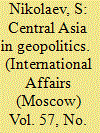

|
|
|
|
|
| Publication |
2011.
|
| Summary/Abstract |
CENTRAL ASIA has a rich history. At one time, it boasted the Great Silk Road, a major trade route between Europe and China. It was also an arena where Chinese, Mongolian, Persian, Turkish, and Arabian military commanders led their armies in brutal battles, prosperous towns were built and destroyed, and huge empires appeared and disappeared. So researchers have examined this region in the most diverse geographical configurations.
After the collapse of the Soviet Union, Central Asia became an independent geopolitical entity comprised of Kazakhstan, Kyrgyzstan, Tajikistan, Turkmenistan, and Uzbekistan. This concept became firmly ensconced in Russia (although during Soviet times, the region was defined as the Central Asian republics and Kazakhstan) and is adhered to by most experts in the West and the East. The OSCE also understands Central Asia as precisely these five former Soviet republics. There are also such projects as the "EU and Central Asia: Strategy for a New Partnership" and the "Central Asia plus Japan" which are aimed at developing relations with the region's states.
|
|
|
|
|
|
|
|
|
|
|
|
|
|
|
|
| 2 |
ID:
104281
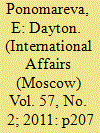

|
|
|
|
|
| Publication |
2011.
|
| Summary/Abstract |
Dayton, Ohio, is home to a U.S. Air Force base and undoubtedly one of the symbols of the new world order. Alongside Brussels, The Hague, Strasbourg, and Rambouillet, it is associated with redealing out cards of History and reestablishing rules of the political game. You will recall that the General Framework Agreement for Peace in Bosnia and Herzegovina (Dayton Agreement) was initialed on November 21, 1995. The Agreement went into effect on December 14, 1995 after its signing in Paris. Its guarantors were the USA, UK, France, Germany, and Russia. The coming into force of this Agreement put an end to the armed confrontation in Bosnia and Herzegovina in 1992-1995; it separated the warring sides and set apart territories of the Republika Srpska and the Muslim-Croat Federation.
|
|
|
|
|
|
|
|
|
|
|
|
|
|
|
|
| 3 |
ID:
104274
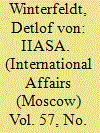

|
|
|
|
|
| Publication |
2011.
|
| Summary/Abstract |
International Affairs: The Soviet Union and the United States joined hands to establish the International Institute for Applied Systems Analysis (IIASA) at the height of the Cold War, a geopolitical standoff. What prompted the two superpowers during the era of confrontation to start an organization of this sort?
Prof. Detlof von Winterfeldt: It started with a conversation between President Johnson and Premier Kosygin in the United States; it was connected to a meeting they had at the UN at that time. One of the topics they discussed was essentially something you may consider science diplomacy, or diplomacy through science. And the idea was born that an international institute founded primarily by the Soviet Union and the United States and their respective allies would be a good vehicle to study problems of joint interest, problems of the industrialized countries that we shared, like pollution and energy. And also behind that, I believe, was the aspect that it would be good for both blocs if scientists could meet unencumbered with ideological, political issues and they could meet to exchange ideas, for a mathematician is a mathematician whether he is a communist mathematician or a capitalist mathematician. So soon after that meeting between Johnson and Kosygin, their advisers, and especially McGeorge Bundy of the United States and Dzhermen Gvishiani of the Soviet Union were the main men who moved this forward. And in 1972, IIASA was born, and Austria provided it with a castle, and we pay only a nominal fee for the castle, less than one euro a year. And so, we've been there since 1972, and the emphasis of research has shifted somewhat.
|
|
|
|
|
|
|
|
|
|
|
|
|
|
|
|
| 4 |
ID:
104283
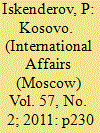

|
|
|
|
|
| Publication |
2011.
|
| Summary/Abstract |
THE ADVISORY OPINION issued by the International Court of Justice last June said that "the declaration of independence on the 17th of February 2008 did not violate general international law"; the Court, however, refused to recognize Kosovo as an international legal subject1 thus driving the Kosovo issue into a legal impasse. The Albanian authorities of Kosovo which looked forward to a prompt international recognition were disappointed: only two UN members (Honduras and Kiribati) joined the countries which had recognized Kosovo's self-proclaimed independence. Today there are 71 of them.2 In an absence of a more or less coherent EU Balkan policy, the contradictions between the Serbs and Albanians can be hardly settled within the framework of its integration models. On the one hand, Brussels accelerates negotiations between Belgrade and Pristina under supervision of Catherine Ashton, High Representative of the Union for Foreign Affairs and Security Policy; on the other, it destabilizes the situation in conflict zones elsewhere.
|
|
|
|
|
|
|
|
|
|
|
|
|
|
|
|
| 5 |
ID:
104286
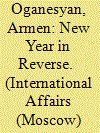

|
|
|
|
|
| Publication |
2011.
|
| Summary/Abstract |
IN RESPONSE to my lamenting about how difficult it is to choose a topic for an article at New Year, a historian I know said with a shrewd wink: "Write about New Year 'in reverse.'" Anticipating my bewilderment, he went on to say that he has long used this kind of exercise; he chooses a recent date and, reading it in reverse, tries to reinstate what was happening in world history at that distant time.
|
|
|
|
|
|
|
|
|
|
|
|
|
|
|
|
| 6 |
ID:
104255
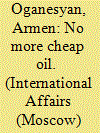

|
|
|
|
|
| Publication |
2011.
|
| Summary/Abstract |
ACCORDING TO Suleiman Jasir Al-Herbish, Director-General of the OPEC Fund for International Development (OFID), there will be no more cheap oil. We met at the OFID headquarters in Vienna, a magnificent palace built in the days of the Austrian Empire and richly decorated with columns, stucco, massive oak doors and red carpet runners.
Since 1976, OFID has been a major international development agency, as well as an authoritative research and analysis center. The Fund's main task is to strengthen cooperation and OPEC's influence in developing countries. Financial assistance provided by the Fund has exceeded $10.6 billion, including more than $1.4 billion in the form of grants. Mr. Al-Herbish's assessment of the current state of the global market and the strategy for the development of the oil sector is all the more interesting because he previously served as chairman or member of the board of some of the largest Saudi Arabian oil companies.
|
|
|
|
|
|
|
|
|
|
|
|
|
|
|
|
| 7 |
ID:
104258


|
|
|
|
|
| Publication |
2011.
|
| Summary/Abstract |
THE OSCE SUMMIT IN ASTANA (Kazakhstan) held after an 11-year break was undoubtedly a significant event in the recent life of the Organization. In the final analysis, the very fact of a meeting between Euro-Atlantic and Eurasian heads of state and government aimed at restoring the culture of political dialogue within the OSCE and setting political guidelines for further progress was very important.
Much of the credit for this goes to Kazakhstan. Such a large-scale event could hardly have taken place under any other Chairmanship. The OSCE participating states have paid tribute to a country which in the 19 years of its existence has made impressive progress in all areas of its national development and has successfully borne the burden of directing a number of large international organizations.
|
|
|
|
|
|
|
|
|
|
|
|
|
|
|
|
| 8 |
ID:
104247


|
|
|
|
|
| Publication |
2011.
|
| Summary/Abstract |
International Affairs: The latest OSCE summit was held for the first time in its history in an Asian capital. What's your take on the results of the Astana Summit?
Marc Perrin de Brichambaut: I think the Astana Summit turned out to be a very positive summit. Twenty-five heads of state were there plus the others at a very high level. It was quite an achievement for our organization. It put back into the limelight the issues of pan-European security after a period where there was much doubt and problems. We managed to have an excellent declaration after many years in which we had problems. The fact is that it includes a very powerful recommitment to upholding the main values, standards and commitments of the organization; the fact is that it is very forward-looking and spans a large spectrum of activities. That's really a big boost for the organization.
|
|
|
|
|
|
|
|
|
|
|
|
|
|
|
|
| 9 |
ID:
104285
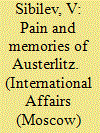

|
|
|
|
|
| Publication |
2011.
|
| Summary/Abstract |
DECEMBER 2, 2010 marked 205 years of the Battle of Austerlitz, one of the most famous and dramatic battles in Europe in the history of the Napoleonic Wars, that took place near Austerlitz (Czech: Slavkov u Brna) near Brno and colorfully described in Leo Tolstoy's War and Peace.
For the number of troops involved (more than 160,000, including approximately 90,000 on the side of the Russia-Austria allies and 75,000 on the French side) and for the number of killed, wounded and taken prisoner (between 35,000 and 45,000 according to different sources), this battle is among the most murderous of the wars involving Napoleonic forces after the battles of Borodino and Leipzig.
|
|
|
|
|
|
|
|
|
|
|
|
|
|
|
|
| 10 |
ID:
104276
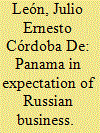

|
|
|
|
|
| Publication |
2011.
|
| Summary/Abstract |
International Affairs: Mr. Ambassador, it is known that the interoceanic Canal has been and remains Panama's greatest national asset. How does this waterway operate today?
Julio Ernesto Córdoba De León: Panama is a small country but has many advantages. First of all, this includes Panama's privileged geographical position and our interoceanic Canal with an average annual traffic of 14,000 vessels. Due to the modern infrastructure built in the country, we account for 5% of world trade. Six ports along the Canal connect the republic with more than 80 countries by 144 maritime trade routes. The Canal handles about 4% of global cargo traffic and 16% of U.S. cargo traffic.
|
|
|
|
|
|
|
|
|
|
|
|
|
|
|
|
| 11 |
ID:
104244


|
|
|
|
|
| Publication |
2011.
|
| Summary/Abstract |
Armen Oganesyan, Editor-in-Chief of International Affairs: The year 2011 is a notable year for Russian-U.S. relations, primarily due to the completion of the ratification of the START III Treaty. What is Moscow 's reaction to the U.S. resolution accompanying the ratification?
Sergei Ryabkov: Consideration of the treaty in the Senate took a long time and that did not come as a surprise. There was only a certain measure of concern when some U.S. politicians, including current senators, sought not only to interpret anew some of the treaty provisions but also to amend its text. Fortunately, that did not happen and one should give credit to the Obama administration that had mobilized its entire political resources to convince those in doubt and opponents about the importance of the document and its necessity from the point of view of U.S. national security interests. Significant forces were involved in that work: former U.S. state secretaries, secretaries of defense, and national security advisers. Moreover, not only from Democratic but also from Republican administrations.
|
|
|
|
|
|
|
|
|
|
|
|
|
|
|
|
| 12 |
ID:
104249


|
|
|
|
|
| Publication |
2011.
|
| Summary/Abstract |
Novyy Vensky zhurnal: Mr. Zmeyevskiy, how can the international organizations in Vienna, which interact with the Permanent Mission of the Russian Federation, help to carry out the tasks posed by President Dmitry Medvedev aimed at Russia's modernization?
Alexander Zmeyevskiy: The international organizations in Vienna have significant expert potential and experience in implementing large innovative projects in the most diverse areas. They can also contribute to solving Russia's modernization tasks in the interests of our country's long-term development. Let us take, for example, atomic energy development programs, which constitute a separate vector within the framework of the modernization project. Progress in this area is impossible without extensive international cooperation, a perceptible role in which is played by the IAEA. In accordance with the functions set forth in its statute, the Agency is authorized "to encourage and assist research on, and development and practical application of, atomic energy for peaceful uses throughout the world ..." Today the world atomic energy industry is undergoing rapid development. The demand for energy-efficient and safe nuclear technology is steadily rising. Russia, which possesses immense scientific and industrial potential in this sphere, is traditionally one of the leaders in fundamental and applied research, as well as in the building and operation of atomic energy plants, including in China, India, Bulgaria, and now in Belarus. The IAEA platform offers broad opportunities for promoting Russia's advanced technology for the world market and for exchanging experience, knowledge, and achievements in the nuclear sphere.
|
|
|
|
|
|
|
|
|
|
|
|
|
|
|
|
| 13 |
ID:
104287


|
|
|
|
|
| Publication |
2011.
|
| Summary/Abstract |
AFTER FRANCO DIED in November 1975, Spain entered a period of its history known as the "Transition" - the transition from dictatorship to democracy. The Soviet Union followed with interest the process of democratization of political life in Spain and wished it success on this path. In January 1977, the Spanish government invited the USSR to hold talks on the establishment of diplomatic ties. Moscow agreed. On the Spanish side, the talks were entrusted to Antonio Elias Martinez, General Director of the European Department of the Spanish Ministry of Foreign Affairs. The talks were held on January 26 and 27 and went smoothly. It was decided to establish diplomatic ties and exchange ambassadors. To emphasize the importance of this agreement, notes were signed by the ministers of foreign affairs of the two countries: A. Gromyko on the Soviet side and M. Oreja Aguirre on the Spanish side. The success of the talks on the establishment of diplomatic relations showed the mutual desire of both countries to turn a new page in their relations.
|
|
|
|
|
|
|
|
|
|
|
|
|
|
|
|
| 14 |
ID:
104278


|
|
|
|
|
| Publication |
2011.
|
| Summary/Abstract |
Armen Oganesyan, Editor-in-Chief of International Affairs, advisor to the RF Minister of Foreign Affairs: Ahead of the Russian-NATO summit that took place in Lisbon at the end of last year, some observers were full of some naïve optimism, expecting a significant turnaround to emerge in our relations with NATO. However, in my opinion, it did not happen; the expectations were not fulfilled, which became especially obvious after the well-known remarks on the missile defense issue. That said, the documents of the Lisbon Summit for the first time recorded a provision about the need for strategic partnership with Russia. What are the prospects for Russia-NATO coexistence or partnership?
|
|
|
|
|
|
|
|
|
|
|
|
|
|
|
|
| 15 |
ID:
104246


|
|
|
|
|
| Publication |
2011.
|
| Summary/Abstract |
THE YEAR 2010 has become history. The Asia-Pacific Region (APR) which stretches from Iran to Japan and the South Pacific islands used it to leave the global financial and economic crisis behind; move to dynamic development; acquire and strengthen new poles of growth and influence and push forward multisided cooperation.
Much of what was going on there, however, caused concern: repeated flare-ups of old disagreements and conflicts; the challenges and threats of the last few decades as well as the still very much obvious gap between the development levels of some of the states and sub-regions. In other words, very much as before the region scored up impressive achievements and was still grappling with numerous unresolved problems.
|
|
|
|
|
|
|
|
|
|
|
|
|
|
|
|
| 16 |
ID:
104243
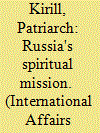

|
|
|
|
|
| Publication |
2011.
|
| Summary/Abstract |
By positing the prospect of eternity, religion can bring stability and predictability to a situation of uncertainty and conflict. The world economic crisis has demonstrated graphically that stable material prosperity is impossible without reliance on such fundamental concepts as spirituality, morality and goodness. Faith is a powerful source of spiritual values. It opens to the people the supreme meaning of existence, gives them hope for the victory of good, and endows them with energy for living.
|
|
|
|
|
|
|
|
|
|
|
|
|
|
|
|
| 17 |
ID:
104282
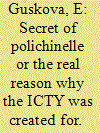

|
|
|
|
|
| Publication |
2011.
|
| Summary/Abstract |
LATE IN THE 20TH CENTURY, the future of the peoples of Yugoslavia no longer belonged to them: it was planned in other countries by top bureaucrats and numerous old and new international structures. The multinational federation was gradually sinking into a crisis punctuated with tragedies, unpredictable and often steep turns and illogical decisions many of them a result of international efforts. Indeed, the Balkan crisis can be described as a glaring example of efficiency and inefficiency of peacekeeping efforts of international organizations which shouldered a misplaced role of arbiters and judges of multisided domestic inter-national conflicts. The lessons to be learned will keep busy many generations of historians and politicians.
|
|
|
|
|
|
|
|
|
|
|
|
|
|
|
|
| 18 |
ID:
104284


|
|
|
| 19 |
ID:
104256
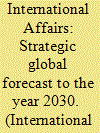

|
|
|
|
|
| Publication |
2011.
|
| Summary/Abstract |
THE EXTREMELY COMPLICATED TASK of long-term forecasting calls for the systemic analysis of global trends to make concrete assessments and recommendations. It would be expedient to use such forecasting to elaborate a strategy for developing and consolidating the national security of Russia to raise the quality of life of its citizens by strengthening its international positions and impact on world processes.
Specialists at the Institute of World Economy and International Relations (IMEMO) have gained extensive experience and developed methodologies in forecasting, allowing them to make qualitative descriptions of strategically important long-term trends. In so doing, they also take international forecasting practices into account.
|
|
|
|
|
|
|
|
|
|
|
|
|
|
|
|
| 20 |
ID:
104240


|
|
|
|
|
|
|
|